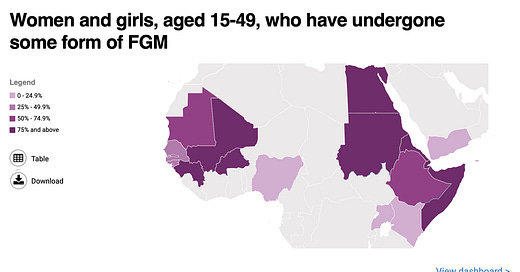It’s a gruesome practice committed against girls as young as 7 years-old. And it is still legal in nine states and the District of Columbia.
Nearly a quarter-of-a-billion women and girls worldwide have undergone female genital mutilation, according to the World Health Organization. The number of FGM victims is estimated to grow about 3 million annually.
According to WHO:
Female genital mutilation (FGM) comprises all procedures that involve partial or total removal of the external female genitalia, or other injury to the female genital organs for non-medical reasons. The practice has no health benefits for girls and women and cause severe bleeding and problems urinating, and later cysts, infections, as well as complications in childbirth and increased risk of newborn deaths.
There are no known medical or health reasons for FGM, which can lead to a slew of immediate and long-term serious health consequences including severe bleeding, urination difficulties, cysts, infections, childbirth complications, and even death.
The procedure is practiced in many African and Middle Eastern countries, generally in regions where Islam is prevalent. Globally, 3 million young girls have the procedure forced on them each year. But the procedure is not just practiced abroad. Immigrants have imported FGM to the US. According to estimates, more than half a million young women and girls living in the US have undergone or are at risk of female genital mutilation.
A 1996 federal law (18 USC § 116) banned FGM from being performed on a girl younger than 18 years. It is also a violation of the same federal law to transport a minor-aged girl abroad for the purpose of performing the procedure. Some immigrants would go on an “FGM holiday” to have the procedure performed on their daughters abroad. Yet, the procedure was still being performed in the US. The US Customs and Immigration Service believes girls from Egypt, Ethiopia and Somalia are the most at risk. The State Department has a fact sheet on FGM it has distributed to high risk groups seeking entry into the US.
In 2017, two Minnesota families were caught taking their 7-year old daughters to a Michigan doctor to perform the procedure. It was the first time someone in the US had been criminally charged with committing the gruesome act. An investigation discovered a Muslim sect in the Detroit metropolitan area had performed FGM on as many as 100 girls as young as seven years old, mostly from Illinois, Michigan and Minnesota. Charges against the Michigan doctor were eventually dismissed by a federal judge.
Due to a rise in FGM in the immigrant community, Minnesota legislators crafted a bill that included education and outreach efforts and increased penalties for performing FGM. Initially, the bill enjoyed tremendous legislative support and was on the road for quick approval. The bill sailed through the Minnesota House on a 124-4 vote but met fierce opposition in the Senate. The state’s influential Somali population (estimated 88,000) rose-up to defeat the measure in the senate. Senators, including the bill’s senate author (Sen Karin Housley) backed down and killed the bill after meeting with immigrant groups. A 1994 Minnesota law banning the practice is still on the books.
Several Minnesota-based immigrant groups opposed the legislation. They argued the bill was too punitive and it was offensive to some immigrant communities. Others argued it was unfair to single-out certain cultural practices and equated female genital mutilation to parents spanking their children.
Shortly thereafter, the federal law ran into stiff headwinds. In 2018, US District Judge Bernard Friedman (appointed by Ronald Reagan in 1988) ruled the US law was unconstitutional. Friedman argued Congress did not have the authority to ban the practice.
Maine, which is also home to a sizable Somali population (estimated 10,000), had legislation introduced in 2017 in the general assembly to ban the practice for girls younger than 18 years. Co-sponsored by Maine Senator Joyce Maker (R-Washington), the measure became the topic of fierce debate.
The American Civil Liberties Union worked feverishly to defeat the Maine measure. That summer, this correspondent hosted a live television special in Washington, DC to discuss the topic. The ACLU declined without explanation repeated invitations to join the balanced panel.
After the television special was over an ACLU representative reached out to justify the organization’s opposition to the bill. The ACLU was opposed to the FGM procedure performed on children but thought it was more important to deny a political victory to the bill’s co-sponsor state Senator Maker. “We don’t want another Susan Collins on our hands,” the representative explained. Apparently, the ACLU did not want Maker to gain prominence and reach higher elected office. This is an example when civil liberties take a back seat to politics at the ACLU.
Today, Maine is one of nine states and the District of Columbia that have yet to ban the practice, according to global advocacy group Equality Now. The other states that have not outlawed FGM are Alabama, Alaska, Connecticut, Hawaii, Mississippi, Montana, Nebraska, and New Mexico.
Mark Hyman is a 35-year military veteran and an Emmy award-winning investigative journalist. Follow him on Twitter, Gettr, Parler, and Mastodon.world at @markhyman, and on Truth Social at @markhyman81.
Mark welcomes all news tips and story ideas in the strictest of confidence. You can reach him at markhyman.tv (at) gmail.com.





